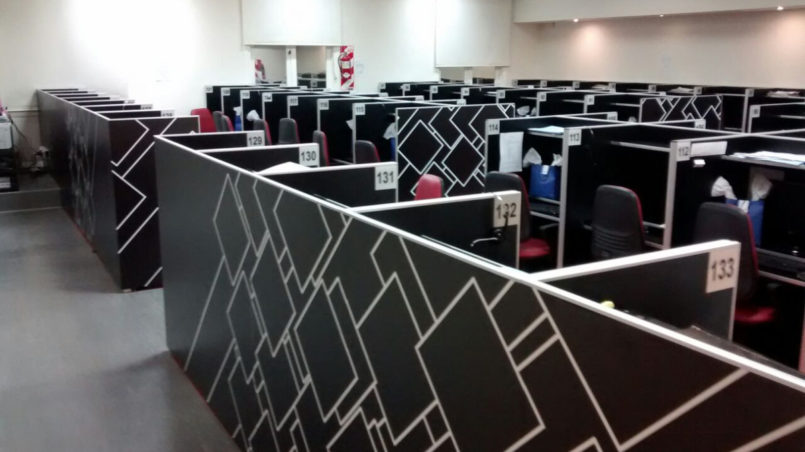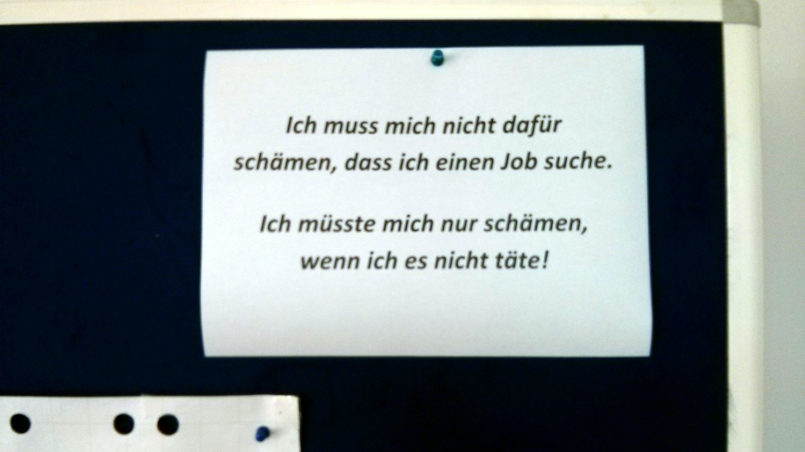Full employment? It’s just an illusion!

It is no longer a secret: full employment as was possible during the days of the ‚economic miracle‘ is an illusion in our time. Our economy has long exceeded the point of saturation. More and more people are affected by structural unemployment – in many cases despite good or excellent qualifications. A departure from the old paradigm is sorely needed.
Automatization
Due to the massive technological progress in recent decades, more and more traditional labor-intensive jobs have been partially or completely rationalized.
A small example:
What should be a boon to mankind, actually relieving us from unsatisfying, monotonous and possibly harmful work and opening time for personal development and the improvement of life quality, has deepened our bondage instead:
Pressure
Yet another effect inevitably results from this race against reduction:
The cost of care for the burned out and exhausted jobholders, of course, are yet again not taken over by the companies that have benefited from their performance – it is once more us, the general public, who is left to pay the bill, while all the company has to do is pick the next in line from a virtually inexhaustible pool of hopeful applicants. This sickening downward spiral already has social consequences, some of which quite dramatic.
In Austria, the cost for the care of burnout sufferers amounts to around seven billion Euros per year, according to WIFO. Other studies show that 30 to 40 percent of employees have already detached from their jobs internally. 43 percent of employees aged from 35 to 55 years would immediately go into retirement if they could. Diseases that are caused by mental stress, were the third leading cause of sick leave in 2013.
Source: www.wirtschaftsblatt.at
Threatening to deprive people of their livelihood in an environment where, as in our latitudes, there is an abundance of all relevant things, is repressive, inhuman and has absolutely nothing to do with democracy or freedom. But what are the reasons for this?
Since the 90s, productivity in Austria has risen by about 37%
Source: Arbeiterkammer Burgenland – 2014
In some cases real wages even declined in Austria since the 90s
Source: OECD Statistics 2015
This enormous discrepancy between productivity growth and stagnant or declining wages is socially explosive. Here, the question of fairness of the system as a whole is unavoidable. A view of the distribution of wealth in Austria (as in almost all countries of the “western world”) can shed some light onto the topic.
5% of the population own 45% of total assets
While the bottom 50% of people do not even have 4% at their disposal.
Source: Oesterreichische Nationalbank: Facts about wealth distribution in Austria .2012, p 261.
To keep up this unspeakable condition, several perfidious psychological tricks are used. For one, the structures of power and ownership are hidden in our day. There is no obvious mechanism of redistribution. Diffuse concepts like “the markets” or “the laws of economy” obfuscate the systematology.
A further means of manipulation is the artificially upheld economic survival struggle. In our society of abundance, people are excluded from the services and goods they need, because they can not, or have difficulty to comply with the artificial pressure. This manipulation method deeply interferes with human consciousness, since on some level we feel that the neverending hours of meaningless and bleak work are not really necessary, yet must not object let we be called lazy.
We do not enjoy the fruit of our progress to the extent due to us, we are merely running on the spot or even moving backwards.
The assumption that the loss of jobs, or rather the decline in demand for working hours must necessarily lead to depletion, is however a perfect fallacy. This relationship exists only as long as we accept what has been hammered into us for centuries … that we only have a right to live if we put our energy in the service of this aloof machinery.
Stigmatization of the losers of the predatory competition
Neoliberalism, by means of complex instruments of indoctrination, is poisoning people’s thoughts and playing them off against each other. It brings the weak to attack the even weaker and causes entire societies to view the poor, weak and sick as ‘parasites’, ‘roman-style decadent’, ‘envious’, ‘lazy’or more along the same lines, actually despising them. The dignity of the unusable is constantly threatened. Not exclusively by, but also including the Left who feel compelled to speak of ‘socially weak’ in the fight against poverty, thereby supposedly representing their interests.
Magda von Garrel, political theorist and special education teacher
Second class people
Bad enough how the labor market presents itself – even more inhuman, however, is the macchination that has to be endured by about ten percent of working age persons at any given time these days, because they had the misfortune of losing their jobs. Floating over it all, there seems to be the unspoken credo that first and foremost we must protect the public from the wily and tricky laziness of those affected.
The harassments are manifold: In ever new ways, it comes to payment delays or accidental discontinuation of payments and insurance – mostly due to subpoenas not received (which are mysterious piling up, since the AMS is no longer obliged to deliver notifications via certified mail) or unexplained misunderstandings concerning the end of sick leaves between AMS and health insurance.
People who live by subsistence and have no reserves, are hurdled into serious trouble by such “carelessness” on part of the AMS, for if they can not transfer their fixed costs at the beginning of the month, default charges and miscellaneous fees will be added. Whoever is an inconvenience, may at any time be plunged into disaster – and this mere possibility is deeply frightening.
Whether these incidents occur maliciously or accidentally – they are simply too commonplace to be excusable. A good source for getting an impression of what transpires, are sites like http://www.soned.at as well as the experiences of any given unemployed person, who ever attended a class surrounded by other fellow persons affected, only to find that the problems and delays described happen on a regular base.

The fact is, there are people whom the labor market neither wants nor needs. “Teamwork skills” and “stress resistance” are not given to everyone – anyone who is, for example, a rather introverted personality type, will quickly get overwhelmed when constantly forced into social situations, rather than being allowed to simply engage in their task untroubledly.
People who suffer from chronic health problems, or need sick leave more than one or two times a year for whatever reason, will eventually be replaced, no matter how well they may do their job. Anyone who is unable to cope with constant stress or a harsh working environment – yet might thrive under the more manageable and less hectic working conditions our parents and grandparents knew – is now left in the basket and finds him/herself confronted with the cliché of the lazy, antisocial and unwilling holdout, someone trying to make a beautiful life for themselves on others’ expense.
For how many of those registered as unemployed, might this blanket condemnation be true? Is it permissible to stigmatize, marginalize and victimize all those who simply can not keep up, in the hopes of punishing a few, who perhaps really could, but won’t?
And more importantly – at least viewed from the economic point of view – is the expensive bureaucracy truly pulling its weight? The endless frustration and humiliation, adding low self-esteem and depression to the many problems of unemployment persons – resulting in a poor general state of health which subsequently means yet more expenses at the cost of the public – is any of it really helping anyone?
Authors: Nikolaus Manoussakis, Serena Nebo






